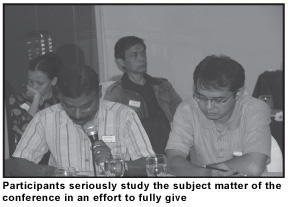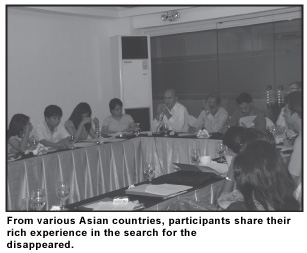Introduction
The phenomenon of enforced disappearances was and
unfortunately still is practiced in many countries to silence political
opponents. The families of the victims not only have to face the
economic and emotional consequences of the loss. They also have to cope
with the impact of the insecurity about the destiny of their beloved
ones, the social stigma and the resulting psychological problems.
Psychosocial support and a good coordination of all
disciplines involved in the search for the enforced disappeared persons,
in the struggle for justice and truth and in exhumation process is
important to reach the common goal: to support the families in the
best possible way. Psychologists, forensic anthropologists, lawyers,
human rights workers, family organizations and family members of the
disappeared have to do their acts together to reach this goal.
Background
The 1st International Congress on Psychosocial Work
in the Search for Enforced Disappeared Persons in Exhumation Processes
and the Struggle for Justice and Truth, was held in Antigua, Guatemala
in February 2007. As a result of the Congress, a working group
consisting of people from the different disciplines involved in the
search for enforced disappeared, the struggle for justice and
truth and in exhumation processes, worked together on a proposal for an
International Consensus on Minimum Standards for Psychosocial Work in
Exhumation Processes of Serious Human Rights Violations.
The need to continue the interdisciplinary debate and
discussion both at the international and regional levels was the basis
to organize the
1st Asian Conference in Manila, Philippines on 9-11 November 2009.
This event was organized by the Equipo de Estudios Comunitarios y
Acción Psicosocial (ECAP) - Team of Community Studies and
Psychosocial Action from Guatemala (ECAP), and the Asian Federation
Against Involuntary Disappearances (AFAD)– as the substantial regional
partner in Asia – and GEZA. The Asian conference forms part of an
international conference cycle that will culminate with the Second
International Conference that will be convened in Bogotá, Colombia on
21, 22 and 23 April 2010. The idea is to present the rich Asian
experiences and the outcome of the Asian conference to an international
audience.
Preparations and Goals
To prepare the event, Ms Katharina Lauritsch was
assigned to investigate the situation of families of enforced
disappeared in the different Asian countries, search for Asian actors,
contact experts working in the field and encourage them to comment on
the validation form of minimum standards for the psychosocial work with
families of enforced disappeared. As the validation form was developed
in the Latin American context, the proposed standards reflect to a
certain point the experiences made there. The comments from the
different Asian experts helped us continue to understand better the
working context here and to incorporate the Asian perspective into the
document.
The goal of the conference has been to learn from
different experiences, discuss the present state of psychosocial support
during the search for the enforced disappeared persons and in exhumation
processes, work on the validation of proposed international minimum
standards, strengthening the Asian network of professionals and family
organizations and encourage the participants to document their work,
giving the Asian experiences a strong voice.
Results
In the first Asian conference, 36 experts from 12
different countries participated.
 On
the first day, we had 17 presentations from psychologists, lawyers,
forensic experts, family organizations and human rights activists. Each
presentation lasted fifteen minutes and each block of 3 presentations
was followed by time to ask questions and for discussion. We could catch
a glimpse of the rich and diverse backgrounds and experiences the
participants brought to the meeting. To see and feel the atmosphere of
high motivation that made the conference room dense was rewarding.
On
the first day, we had 17 presentations from psychologists, lawyers,
forensic experts, family organizations and human rights activists. Each
presentation lasted fifteen minutes and each block of 3 presentations
was followed by time to ask questions and for discussion. We could catch
a glimpse of the rich and diverse backgrounds and experiences the
participants brought to the meeting. To see and feel the atmosphere of
high motivation that made the conference room dense was rewarding.
Issues on the importance of religion and rituals,
political education, special needs of children, forensic aspects, etc.
had been discussed and the audience had been given the opportunity of
exchanging and learning from different conditions. This first objective
of the conference was highly appreciated by the participants. On the
second day and half of the third day, the validation of the minimum
standard in the Asian context took the center. We continued working in
groups about psychosocial support for families of enforced disappeared,
the role of the State, what alternatives in the support of families are
there if exhumations are not possible and how the collaboration and
coordination between the different actors involved in exhumation
processes and already in the search for enforced disappeared persons can
be improved.
The main arguments were:
a) Even though in Asian countries, very few
exhumations took place already, the minimum standards in exhumation
processes are an important document that contributes to the
systematization and of exhumation processes in the future.
b) The most important issue in Asian countries is the
struggle against enforced disappearances itself. The document is
ambivalent, because it focuses on exhumations. From the Asian point of
view, exhumations are only one of the many possibilities to find the
disappeared persons. Therefore, in the minimum standards document, the
search for the disappeared should be in the foreground.
c) The cultural background should be a general
condition itself and not only "to be taken into account" as one of the
many points in the standards. The participants discussed for example the
different implications for the work with families in countries with
Hindu, Muslim, Christian and other religions as basic preconditions.
d) One important point of the participants were the
difficulties with understanding the terms used in the form. Many of them
in the Latin American context probably make sense. However, in the Asian
context these terms, while applied in some situations, are not very
well-used (e.g. accompaniment, community, integral care, integral
reparation, etc.). On the other hand, a central term like "exhumation
process" is, in some parts, referred as forensic anthropological
excavation and in other parts, as the whole process of search and
struggle for truth and justice. A common point therefore was the need
for a clear terminology and an extension of the glossary.
e) The chapter in the minimum standards document
about "the State" has deemed it necessary for an additional standard for
social and political situations where the state doesn’t fulfill his
obligations. In the Asian context, the minimum standards are "maximum
standards" in the sense that there is no trust in actual political
systems, even if these are in the context of democratically-elected
governments.
f ) As a special contribution to the validation, the
participants discussed alternatives, in case no exhumations are
possible.
 A
clear outcome was that enforced disappearance is world widely known as a
Latin American phenomenon. Asian countries however, reported the highest
number of cases to the UN Working Group on Enforced Disappearances in
recent years, therefore the Asian contribution to the minimum standards
and to the international discussion about the psychosocial support for
families of enforced disappeared persons in general should be highly
taken into account. Further on the third day, the participants wrote
separate letters to the presidents of the Philippines and Indonesia,
urging them to ratify the International Convention for the Protection of
All Persons from Enforced Disappearance.
A
clear outcome was that enforced disappearance is world widely known as a
Latin American phenomenon. Asian countries however, reported the highest
number of cases to the UN Working Group on Enforced Disappearances in
recent years, therefore the Asian contribution to the minimum standards
and to the international discussion about the psychosocial support for
families of enforced disappeared persons in general should be highly
taken into account. Further on the third day, the participants wrote
separate letters to the presidents of the Philippines and Indonesia,
urging them to ratify the International Convention for the Protection of
All Persons from Enforced Disappearance.
Moreover, the organizers presented the idea to
publish an Asian documentation about the working context and the
experiences of professionals and families working with families of
enforced disappeared persons.